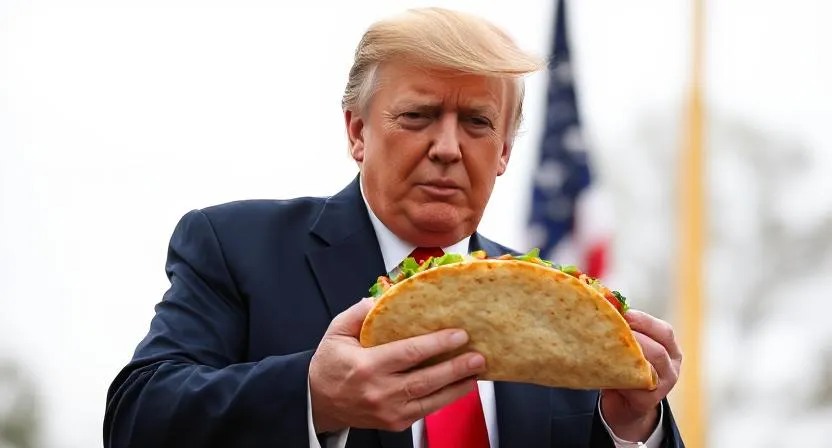In a weird sort of way, President-cum-Dictator Donald J. Trump operates like a jazz musician – he keeps making things up as he goes along.
But our boy is no John Coltrane.
The nonsense Trump continually spouts on issues like tariffs have more in common with Lou Reed’s Metal Machine Music – a violent assault on the senses, particularly the ears – than Coltrane’s masterful Giant Steps. Trump’s improvisations tend to leave audience members stupider than when the performance began.
His apparent descent into insanity was on full display this week when he imposed a 10 percent tariff on all imports, with even higher levies adopted for goods brought in from particular nations, most of whom the U.S. considers allies.
You can’t find a minimally capable economist who maintains this assault on the world economy makes any sense. Hell, you can’t find a community college freshman taking ECON 101 as a course requirement who can make heads or tails of it. It is simply a product of Trump’s obviously fried brain that will swell inflation, devastate local economies and make this once respected nation a pariah among its trading partners.
Stellantis, aka Chrysler for you fellow old folks out there, announced on Thursday it was temporarily laying off 900 workers at five U.S. facilities in wake of the Trump announcement. Also on Thursday, the day after the notice, Bloomberg determined the president-cum-dictator’s decision hit the S&P 500 Index with a $2.5 trillion loss.
Fears of a recession abound.
Don’t believe it? Let’s turn to Sen. Rand Paul, R-Bowling Green, a liberal by absolutely no one’s estimation and a constant scold on the $36.7 trillion debt, who foresees doom down the road, claiming that “the people who are for tariffs are just wrong.”
Appearing on Rising, a podcast by The Hill, a Capital centric newspaper, Paul asserted that he supports Trump’s agenda on most fronts.
“…but on tariffs I think it’s just economically …it’s a fallacy to think it will help the country,” Paul said. “Tariffs are a tax. If you tax trade or if you tax anything you’ll get less of it. We know that looking at the history of the last at least 70 years or so in this country that as international trade has increased so has the prosperity of our country. Really, so has the prosperity of the entire world.”
Paul cited a report maintaining that about 100,000 people escape poverty every day “and it’s really from capitalism and it’s from international trade.”
“It’s the most extraordinary thing that has happened in the history of mankind,” he said.
But in talking with reporters Paul noted that there is another, even more practical reason for opposing the tariff hikes.
“Tariffs have also led to political decimation,” he said. “(President William) McKinley most famously put tariffs on in 1890. They (Republicans) lost 50 percent of their seats in the next election. When Smoot–Hawley put on their tariffs in the 1930’s we lost the House and the Senate for 60 years. So they’re not only bad economically, their bad politically.”
(To be clear, McKinley was a Republican member of the House from Ohio when he successfully passed the McKinley Tariff Act of 1890, which increased tariff rates by nearly 50 percent. He didn’t become president until 1897.)
Paul is being backed in his opposition to Trump tariffs by an unusual source – Sen. Mitch McConnell, R-Louisville. The two lawmakers, who have served together for 14 years, don’t get along for a number of well-publicized reasons. But on Wednesday the pair, joined by two other GOP senators and upper chamber Democrats, merged to block Trump’s effort to impose tariffs on imports from Canada.
That initiative is unlikely to survive – it requires House approval and would most certainly attract a Trump veto if it journeyed to his desk. But the measure is the first congressional effort to resist Trump’s steamrolling.
“At a time when Americans are tightening their belts, we would do well to avoid policies that heap on the pain,” McConnell said after the vote. “We ought to strengthen our friendships abroad, and reinforce our allies as pillars of American prosperity and security.”
Trump has long viewed higher tariffs as a panacea to America’s economic woes – even though the diagnosed maladies are often ephemeral. His rationale for this madness has him riffing like Louis Armstrong on Potato Head Blues, saying a stronger tariffs system could have avoided the Great Depression.
Yes, you heard him right.
From the founding of the republic to 1913, Trump said in extended remarks celebrating what he called Liberation Day when he announced the new levies, “we were a tariff-backed nation, and the United States was proportionately the wealthiest it has ever been.”
During that time, he said, the U.S. was “collecting so much money, so fast, we didn’t know what to do with it.”
“Then, in 1913 for reasons unknown to mankind they established the income tax so citizens, rather than foreign countries, would start paying the money necessary to run our government,” he said.
Quick interjection here – foreign countries don’t pay the tariffs; individuals and businesses do.
Let us continue.
The depression rolled around in 1928 and, according to the history lesson proffered by the president-cum-dictator’s skewed imagination, “it would have never happened if they had stayed with the tariff policy, it would have been a much different story. They tried to bring back tariffs to save our country, but it was gone. It was gone. It was too late, nothing could have been done.”
It is indeed remarkable this man remembers how to breathe. And 70 million Americans thought it was a good idea to make him president once again.
Despite Trump’s claims, the tariff-based U.S. economy was consistently plagued by periodic economic and financial crises, with critical downturns coming in 1873, 1893 and 1907. The Panic of 1893 proved particularly troubling, resulting in a 25 percent drop in the number of jobs.
The U.S. surpassed Great Britain to become the world’s largest economy in terms of GDP around 1890, thanks primarily to industrial growth. While the nation held significant wealth at the time it was highly concentrated. For instance, in 1913, according to a Forbes magazine estimate, John D. Rockefeller was worth around $900 million — nearly 2 percent of the nation’s gross domestic product.
That long-term pattern of acute economic disturbances led some lawmakers in the early 1900s, particularly those from farm states who suffered disproportionately from the ups and downs, to promote an income tax rather than tariffs to form the basis of the nation’s economy. That was achieved through ratification of a constitutional amendment in 1913.
In 1930, near the outset of the Depression, Congress passed Smoot-Hawley to generate additional income. It didn’t work. In fact, studies prove it exacerbated the economic crash, a result Trump should be mindful of.
Just where this might eventually lead is anyone’s guess but it certainly ain’t promising. Paul held out the promise that Congress can intervene to draw the mess to a halt, noting that the new tariffs constitute a tax and the Constitution, which Trump is endeavoring to leave in shreds, insists that taxes originate in Congress.
“This tariff or tax will originate with the signature of one person,” Paul told Rising, referring to Trump. “That’s not what our founding fathers wanted. They didn’t want the executive to have any power like the power to tax.”
So, there’s a possible out. But congressional Republicans, thus far, have been more than willing to follow this mad man wherever he leads.
And what is it going to take for 70 million Americans to come to the realization they’ve been had?
--30--
Written by Bill Straub, a member of the Kentucky Journalism Hall of Fame. Cross-posted from the Northern Kentucky Tribune.








